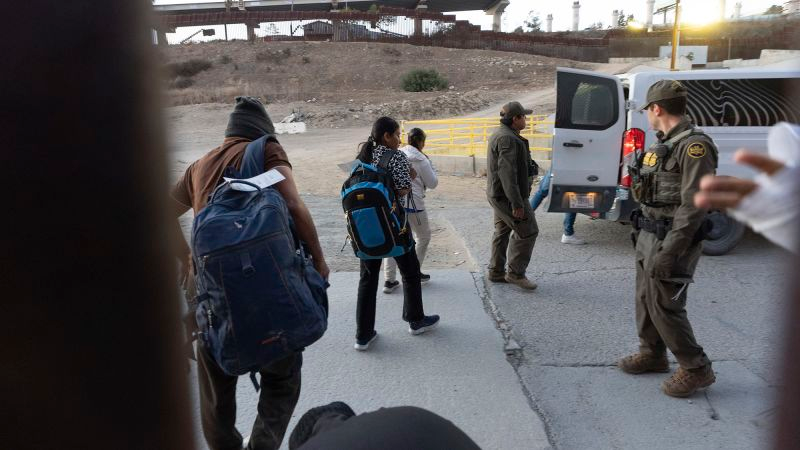Washington CNN —
The Trump administration has moved with lightning speed to roll out the president’s immigration agenda, effectively closing off the US southern border to asylum seekers, severely limiting who’s eligible to enter the United States and laying the groundwork to swiftly deport migrants already in the country.
Within hours of taking office, President Donald Trump signed a spate of executive actions that have already had wide-ranging impacts for people both inside and outside the US. By Wednesday, incoming refugee flights were canceled, troops were moving to the border, federal authorities were given permission to arrest people in or near schools and churches, and the pool of undocumented immigrants eligible for quick deportation without a judicial hearing was expanded.
Behind the scenes, federal agencies, like the Justice Department, were standing up their immigration crackdown, firing people in key leadership roles who oversee the nation’s immigration courts and threatening to prosecute state and local officials who resist the administration’s plans.
The Justice Department has also told legal service providers to stop work intended to help support immigrants, according to a memo obtained by CNN, stripping away critical access for people in detention trying to navigate the tangled US immigration system.
Providers who receive federal funding and work in immigration detention were told by the department Wednesday to stop providing legal orientation, help at immigration courts, and counsel for children, citing one of Trump’s executive orders.
The move had immediate repercussions: Staff manning help desks at certain immigration courts had to be pulled off to avoid falling out of compliance, according to a source familiar with the decision.
“They were telegraphing this from the very beginning,” said Jessica Vaughan, director of policy studies for the Center for Immigration Studies, which favors stricter immigration policies. “It’s delivering on promises made during the campaign and … continuing the work they left off four years ago.”
Over the course of the week, some of the key policies and efforts that Trump launched in his first term were resurrected, including expanding who’s eligible for a fast-track deportation procedure and largely cutting off the refugee resettlement program. He also moved to reinstate the “Remain in Mexico,” program, requiring migrants to stay in Mexico while they go through their immigration proceedings in the United States. The policy requires Mexico’s buy-in.
Late Tuesday, the State Department notified resettlement partners that previously scheduled flights for refugees would be canceled and processing would be suspended, effectively shuttering the program.
“Refugees go through one of the most rigorous vetting processes in the world, and many are now seeing their travel canceled just days, or even hours, before they were set to begin their new lives in the United States. It’s utterly heartbreaking,” said Krish O’Mara Vignarajah, president and CEO of Global Refuge.
With refugee admissions suspended and the border largely sealed off to asylum seekers, there are few, if any, avenues available to people seeking refuge in the United States.
White House border czar Tom Homan told CNN’s Dana Bash Tuesday that targeted enforcement operations by Immigration and Customs Enforcement were already happening, but this time, he argued, agents have greater latitude.
Biden administration enforcement priorities that Trump officials said set up too many hurdles to arresting individual were rescinded. A new directive was issued allowing ICE to conduct enforcement actions in or near sensitive areas like schools and churches.
“Criminals will no longer be able to hide in America’s schools and churches to avoid arrest. The Trump Administration will not tie the hands of our brave law enforcement, and instead trusts them to use common sense,” acting Homeland Security Secretary Benjamine Huffman said in a statement.
But Anna Gallagher, executive director of the Catholic Legal Immigration Network, said the policy change sends “a chilling message to our immigrant communities and create an environment of fear that will prevent people from seeking the support they need and accessing their rights.”
Officials also expanded a procedure to speed up deportations to include undocumented immigrants anywhere in the US who can’t prove they’ve lived in the US continuously for two years or more.
The fast-track deportation procedure, known as “expedited removal,” allows immigration authorities to remove an individual without a hearing before an immigration judge. In doing so, the administration is provided greater latitude in quickly deporting undocumented immigrants.
While the Trump administration has focused much of its effort on interior enforcement, troops are being mobilized to the US-Mexico border to step up the military presence there, according to officials familiar with the matter. They are expected to perform mostly logistical and bureaucratic tasks there, assisting the Border Patrol.
Even more active duty troops are expected to be deployed to the border in the coming weeks and months, one of the officials said, with this first wave laying the groundwork for a larger military footprint.
It isn’t clear whether the troops will be armed. But none of the active duty troops are authorized to perform any kind of law enforcement role, like making arrests or seizing drugs, or engage with migrants other than to help transport them to and around different migrant facilities.
That mission could change as Trump escalates his border plans: The president says he that he will decide within 90 days whether to invoke the Insurrection Act at the US-Mexico border, which would allow him to use active duty troops domestically for law enforcement.
CNN’s Catherine Shoichet contributed to this report.
